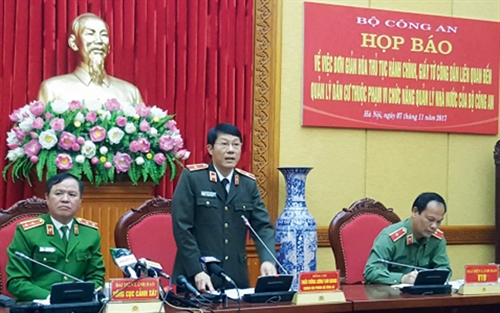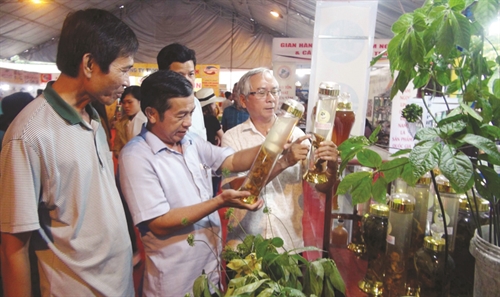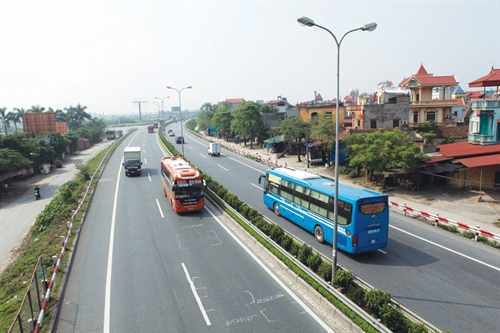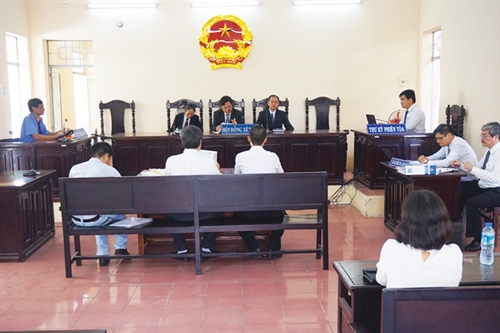The household registration book or so ho khau in Vietnamese will soon become a relic of the past as the Government has resolved to simplify administrative procedures related to residence management.
 |
| Lieutenant General Tran Van Ve answers questions of local press about the abolition of household registration books__Photo: Internet |
Under Government Resolution No. 112/NQ-CP issued on October 30, Vietnamese citizens will be managed solely through their identification numbers on a new online national database. Personal transactions will be performed only through the national identification (NI) number and all changes of personal information will be updated on the national database and recorded in each person’s NI number.
Accordingly, each citizen will be issued a new identity card with a 12-digit NI number, which incorporates all basic personal details such as name, place of birth, fingerprints, permanent address and marital status, and all data relating to birth, death, number of children and criminal convictions. Some of these details are currently recorded in the household registration book and identity card.
With the abolishment of the household registration book, many time-consuming administrative procedures will be scrapped, including formalities to change persons named in the book, obtain a new book when moving houses, deregister permanent residence or extend temporary residence. The procedures to declare temporary residence to the commune-level police will also be abolished. Papers proving family relationship or birth certificates to register permanent residence for children will not be needed either.
Citizens will not have to present household registration books and ID cards when registering vehicles or conditional businesses or carrying out procedures at border gates. When making transactions with administrative agencies, a citizen will only need his or her NI number without having to bring along diplomas, academic records and other papers. One will no longer have to provide basic information such as birth date, gender and place of residence when declaring personal information.
To prepare for this, the Ministry of Public Security is striving to complete gathering personal information of all citizens by early 2019, and by 2020, every citizen is expected to have a new ID card with NI number.
The new ID cards are being issued in 16 cities and provinces across the country in a pilot project and will be expanded later.
Minister of Public Security To Lam stressed removing household registration books was merely simplifying procedures but not abolishing the management through registration of permanent and temporary residence. He noted residents still have to carry out procedures related to residence management but with fewer formalities.
Lieutenant General Tran Van Ve, Acting General Director of the General Department of Police, told local media that the abolishment of household registration books was simply a shift of the method of management from manual to electronic, adding that household registration books will only be removed after the new national population database is put into use.
Explaining this significant reform, General Ve said the management of population is currently performed by various ministries and sectors in a manual manner. As a result, a citizen may be issued by state agencies different papers such as birth certificate, marriage certificate, household registration book, identity card, social insurance book, health insurance card, driver’s license, etc. Although these papers contain the same information such as full name, birth date, citizenship, and so on, citizens are required to present numerous papers when carrying out different administrative procedures because management authorities may have the same data but do not have complete and consistent information of citizens. This also leads to waste of infrastructure and human resources in gathering and storing such information.
To address this problem, the Prime Minister instructed the Ministry of Public Security to quickly develop a national population database which can accurately provide all basic information of citizens for state management and socio-economic development purposes. This database can be used from the central to local levels, helping state agencies simplify administrative formalities and save costs and time for citizens.
The national poplation database, set to redress overlapping management by sharing information among various authorities and bodies, covers 15 fields of information every sector will need.
Standing member of the National Assembly’s Justice Committee Do Duc Hong Ha said with the abolition of household registration books would create more equality for citizens to access to healthcare, education and work since the current management through household registration books has restricted these rights of those who have registered permanent residence in a place but living in another place. This would also help prevent possible corrupt practices related to the residence management through household registration books.
But he said the shift from household registration books to identity cards and identification numbers should be assessed for both positive and negative impacts, saying the management through household registration books has the advantages of ensuring management of immigration as well as maintaining security, defense and social order and safety.
Since becoming effective in the 1960s, the household registration book system has played an important role in Vietnamese people’s lives. As a main method for the Government to manage public security, economic planning, and control of immigration, it is required in many administrative procedures. In many cases, possessing a registration book is a condition for being qualified for a certain job, which has been lamented as causing inequality among people from different regions.
According to a World Bank report on Vietnam’s household registration system released in June 2016, at least 5.6 million people in Vietnam lack permanent household registration in their current places of residence (and have only temporary registrant status), including 36 percent of the population of Ho Chi Minh City and 18 percent of the population of Hanoi.
Although the system has become less rigid over time, concerns persist that household registration limits the rights and access to public services of those who lack permanent registration in their places of residence.-









